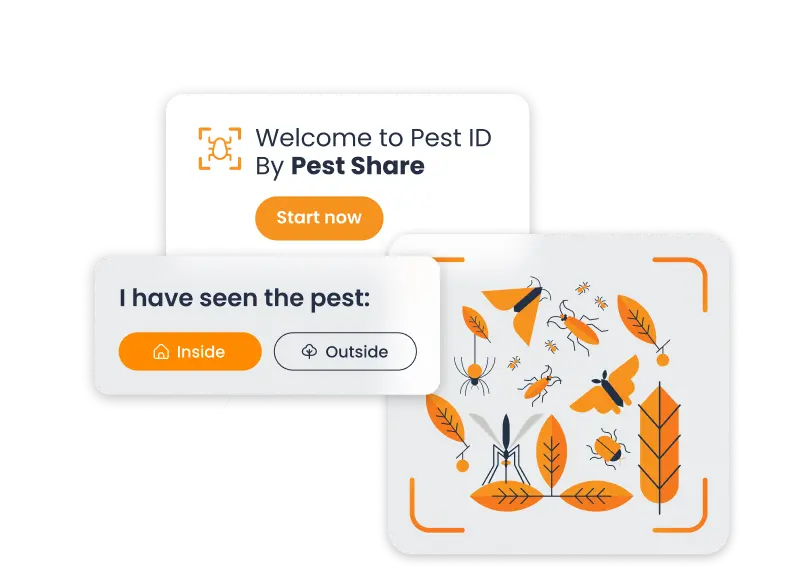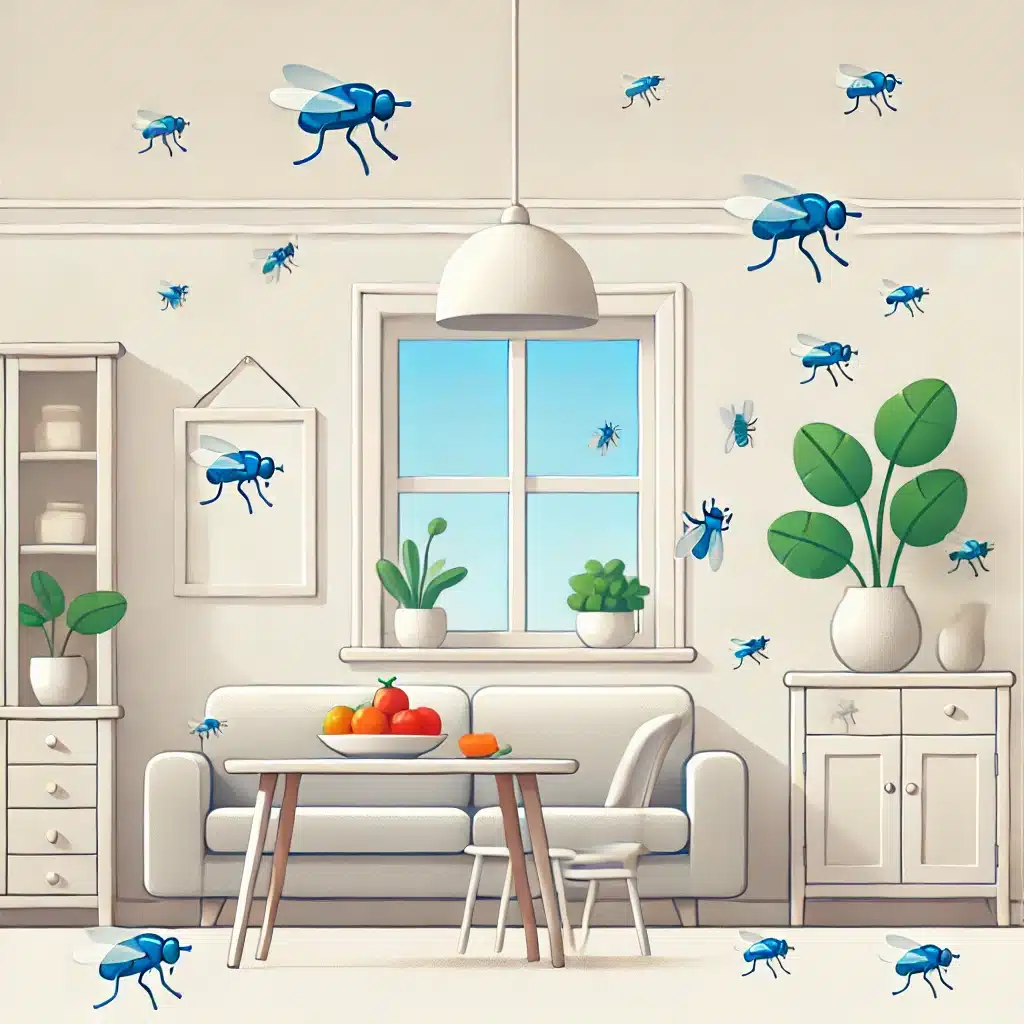As a property manager, you’ve probably had a resident or two complain about strange blue flies buzzing around their kitchen or near the trash area. These blue bottle flies aren’t just annoying—they can signal a deeper cleanliness or maintenance issue. If left unchecked, they can multiply fast and become a problem for more than one unit. That’s why it’s important to understand where they come from and how to handle them quickly.
This guide walks you through everything you need to know about blue bottle flies—from spotting the signs early to preventing full-blown infestations. Let’s dive in and take care of these pests before they spread.
Understanding Blue Flies
Blue bottle flies, also known as blue bottle flies or Calliphora vomitoria, are large, metallic blue flies that are commonly found in and around homes. They are easily recognizable due to their bright, shiny blue bodies and loud buzzing sound. Blue bottle flies are often confused with house flies, but they are typically larger and have a more vibrant color.
These flies are usually found near decaying organic matter, such as garbage, compost piles, and animal carcasses. This is because they lay their eggs in these materials, providing a food source for their larvae. If you notice blue bottle flies in your home, it’s a sign that there might be something decaying nearby, and it’s important to find and remove it quickly.
A typical blue bottle fly infestation starts when an adult fly finds a suitable place to lay her eggs. Each female can lay hundreds of eggs at a time, and within a day, these eggs hatch into larvae, commonly known as maggots. The larvae feed on the decaying material around them and go through several stages before pupating and eventually emerging as adult flies. The entire life cycle of blue bottle flies can be completed in as little as seven to ten days, depending on the temperature and availability of food. This rapid reproduction rate can quickly lead to a large number of flies if not addressed promptly.

Spotted Blue Flies Around the Property?
Are Blue Flies Dangerous?
Many people wonder, “Are blue flies dangerous?” While blue bottle flies are not directly harmful to humans, they can pose certain health risks. One of the main concerns with blue flies is their ability to spread bacteria and pathogens. Because they are often found on decaying matter, they can pick up harmful microorganisms on their bodies and legs. When these flies land on food, kitchen surfaces, or utensils, they can transfer these pathogens, potentially leading to foodborne illnesses.
Blue bottle flies can also contaminate food with their saliva and feces. When they land on food, they regurgitate digestive enzymes to break it down before consuming it. This process can introduce bacteria and other contaminants into the food, making it unsafe to eat. It’s important to be vigilant about keeping food covered and cleaning surfaces regularly to prevent contamination from blue flies.
Another issue with blue bottle flies is their potential to attract other pests. The presence of decaying organic matter not only attracts flies but can also draw in other pests like ants, rodents, and beetles. This can create a bigger problem in your home, as you may find yourself dealing with multiple infestations at once. By addressing the source of the blue bottle fly infestation, you can help prevent other pests from becoming an issue as well.
In addition to the health risks, blue bottle flies can also be a nuisance due to their constant buzzing and presence in your home. They can be particularly bothersome during the warmer months when they are most active. Taking steps to prevent and eliminate blue bottle fly infestations can help maintain a more comfortable and hygienic living environment for you and your family.
Common Causes of Blue Fly Infestations
So, why do blue bottle flies invade our homes? The main reason is that they are looking for places to lay their eggs. They are attracted to decaying organic matter, which is abundant in garbage bins, compost piles, and even pet waste. If there’s anything rotting inside or near your home, it can become a breeding ground for these flies. Sometimes, the source can be as simple as forgotten food in the kitchen or a dead rodent in the attic or basement.
These flies are also attracted to strong smells. Open garbage cans, spoiled food, or any decaying matter can lure them inside. If you notice an increase in blue bottle flies, check for any potential sources of decay both inside and around your home. Remember, blue bottle flies can lay hundreds of eggs, and within a few days, these eggs will hatch into maggots, starting a new cycle of flies.
Another common cause is improperly sealed windows and doors. Blue bottle flies can easily slip through small cracks or gaps. They’re also drawn to light, so they might enter through open windows or doors, especially if there’s food or trash nearby.
Preventing Blue Fly Infestations
Preventing blue bottle fly infestations starts with good hygiene and maintenance practices. First and foremost, make sure to keep your home clean and free of decaying matter. Regularly empty your trash bins, and use lids to keep them sealed. If you have a compost pile, make sure it is well-managed and covered to prevent flies from accessing it.
Here are some practical tips to help prevent an infestation:
Clean Regularly
Wipe down kitchen counters and clean up spills immediately. Make sure to clean under appliances and furniture where food crumbs might accumulate.
Proper Food Storage
Store food in airtight containers. Don’t leave food out in the open, and cover any leftovers.
Seal Entry Points
Check for and seal any cracks or gaps around windows, doors, and screens. This will help keep flies from getting inside your home.
Manage Waste Properly
Ensure that garbage bins are tightly sealed. Take out the trash regularly, especially if it contains food scraps.
Pet Waste
Clean up after your pets promptly. Pet waste can attract flies if left unattended.
Light Management
Use screens on windows and doors to keep flies out, especially in areas where food is prepared or consumed.
By taking these steps, you can significantly reduce the chances of blue bottle flies entering your home and finding places to breed.
Getting Rid of Blue Flies
If you already have blue bottle flies in your home, don’t worry. There are several ways to get rid of them. One effective method is using fly traps. You can buy these at most stores, and they work by attracting flies with bait and trapping them inside. Another option is using sticky flypaper, which traps flies when they land on it.
For a more hands-on approach, you can use a fly swatter to kill any flies you see. It might not be the most pleasant task, but it’s effective for small numbers of flies.
Cleaning is also crucial. Make sure to remove any potential breeding sites by cleaning up any decaying matter, such as garbage or food spills. Vacuuming regularly can help remove fly eggs and larvae that might be hiding in carpets or furniture.
If the infestation is severe, it might be time to call in a professional pest control service like Pest Share. Professionals can assess the situation, identify the source of the infestation, and use more powerful treatments to eliminate the flies. They can also provide advice on preventing future infestations, ensuring your home stays fly-free.
The Role of Professional Pest Control
Sometimes, dealing with blue bottle flies on your own just isn’t enough. That’s where professional pest control services like Pest Share come in handy. Professionals have the expertise and tools needed to tackle infestations effectively. They can identify the source of the problem, which is often hidden or hard to reach, and apply treatments that are more effective than over-the-counter solutions.
Pest Share offers a comprehensive approach to pest control. They don’t just get rid of the flies you see; they address the root of the problem, ensuring that the infestation doesn’t come back. Their services include thorough inspections, tailored treatment plans, and follow-up visits to make sure your home stays fly-free. Plus, using a professional service can save you time and hassle, letting you focus on more important things.
Hiring a pest control service can also give you peace of mind. Knowing that experts are handling the situation means you can relax and not worry about missed spots or incomplete treatments. Pest Share’s experienced technicians can also provide tips and advice on how to keep your home pest-free in the future, adding an extra layer of protection.







